The US Department of Defense has increased the frequency of free navigation operations (FONOP) in the East Sea (internationally known as the South China Sea). As of December 25th 2020, the US Navy had conducted 9 FONOPs in the Hoang Sa (Paracel) and Truong Sa (Spratly) archipelagos, compared with eight in 2019 and six in 2018.
The US Navy also conducted coordination operations of two aircraft carriers for the first time since 2014, while promoting air patrol and submarine deployment.
Sanctions
In April and May 2020, US Navy warships moved close to Chinese survey ships in Malaysia's Exclusive Economic Zone (EEZ). The US Air Force also increased the operation of B52, B1-B and B2 strategic bombers in the East Sea.
The Trump administration accused China of using the pandemic to promote its sovereignty claims and in April urged Beijing to stop provocative activities and bullying practices.
More significantly, the US has taken a clearer stance on the legal basis of China's sovereignty claims.
On June 1, 2020, the US submitted a diplomatic note to the United Nations opposing China's claim to sovereignty in the East Sea because it was inconsistent with the UN Convention on the Law of the Sea 1982 (UNCLOS).
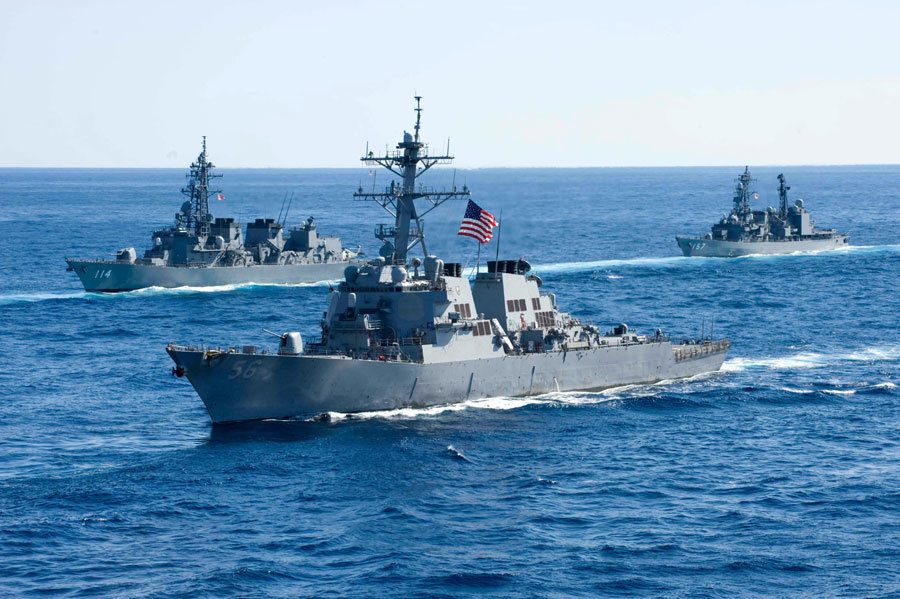 |
|
The US Department of Defense has increased the frequency of free navigation operations (FONOP) in the East Sea
|
On July 13, 2020, Secretary of State Mike Pompeo issued an important statement supporting the PCA’s 2016 ruling.
Specifically, the US rejected China's illegal "9-dash line", its sovereignty claim over the offshore resources in the EEZ of Vietnam, the Philippines, Brunei, Malaysia, and Indonesia as well as the Vanh Khan, Co May and James.
US Secretary of State Mike Pompeo said: “The world will not allow Beijing to treat the East Sea as its maritime empire. America stands with our Southeast Asian allies and partners in protecting their sovereign rights to offshore resources.”
In a speech at a consulting organization in Washington D.C. a day after Pompeo's statement, Assistant Secretary of State for East Asian and Pacific Affairs David Stilwell described Chinese conglomerates operating in the East Sea as tools of economic coercion and international abuse.
According to David Stilwell, during negotiations of the Codes of Conduct in the East Sea (COC), China sought to limit the ability of Southeast Asian countries to conduct military exercises with foreign countries, using intimidation tactics to prevent Southeast Asian countries from making sovereignty statement of cooperation in energy exploitation with non-Chinese companies.
Stilwell also mentioned the possibility that the US would impose sanctions against individuals and businesses participating in implementing Chinese policies in the East Sea.
On August 26, 2020, the US Department of State imposed sanctions on some Chinese citizens responsible for or involved in the large-scale construction, renovation or militarization of disputed outposts in the East Sea.
The US Department of Commerce named 24 Chinese state-owned companies involved in the construction of seven artificial islands in the Spratly archipelago on its “blacklist”.
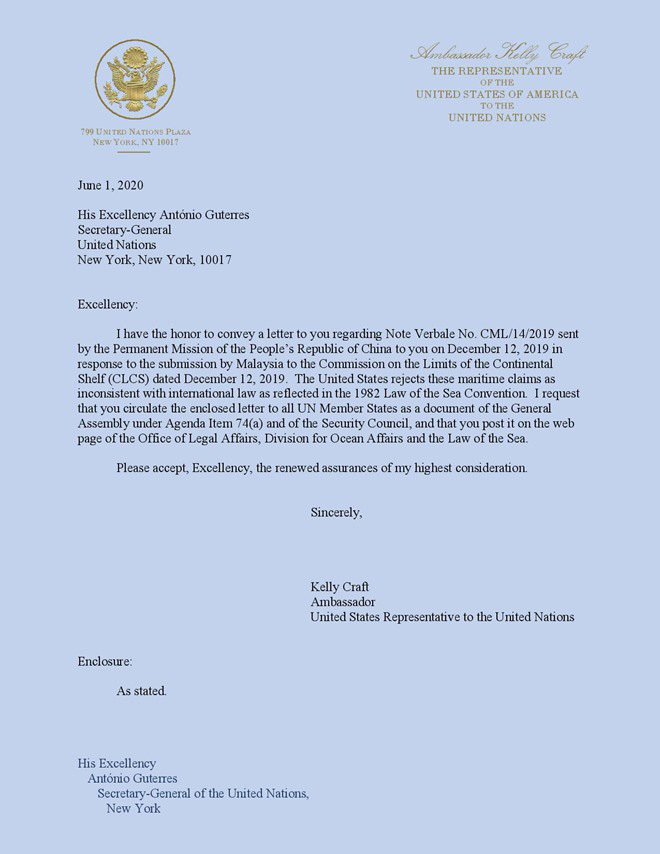 |
|
The note of the US Mission to the United Nations against China's claims. Photo: USUN
|
Reaction of Southeast Asia
Southeast Asian claimants in the East Sea expressed concern over China's aggressive behavior in this water and expressed a tougher stance.
The responses of the Southeast Asian countries were mainly in legal aspects. Since December 2019, Malaysia, Vietnam, Indonesia and the Philippines have sent notes to the UN opposing China’s "9-dash line" "historic rights" claims in the East Sea.
More importantly, by opposing the claim of China, Vietnam, Indonesia and the Philippines clearly mentioned the PCA’s ruling 2016, thereby restoring the validity of this ruling.
Brunei for the first time issued a declaration on the East Sea on July 20, 2020, which emphasized that the negotiations to resolve disputes should comply with the UNCLOS.
ASEAN also emphasized more on the UNCLOS, considering this the foundation for determining sovereignty, jurisdiction and legitimate interests related to the seas.
The Philippines adjusted its stance in the direction of being more rigid. In May, its navy opened a new stop on the island of Pagasa and announced plans to develop infrastructure there.
On the fourth anniversary of the PCA’s ruling, Philippine Foreign Minister Teddy Locsin said the ruling was "non-negotiable". After Pompeo's statement, Philippine Defense Minister Delfin Lorenzana called on China to comply with the ruling. In August, Mr. Locsin announced that if the Philippines were attacked in the East Sea, he would trigger the 1951 military alliance with the US, while Minister Lorenzana argued that the "9-dash line" of Beijing is only imaginary.
Maintaining a long-standing policy, Indonesia reaffirmed its opposition to the "9-dash line" as well as China's proposal to negotiate overlapping claims near the Natuna Islands. In July 2020, the Indonesian army conducted large-scale naval and air exercises near Natuna.
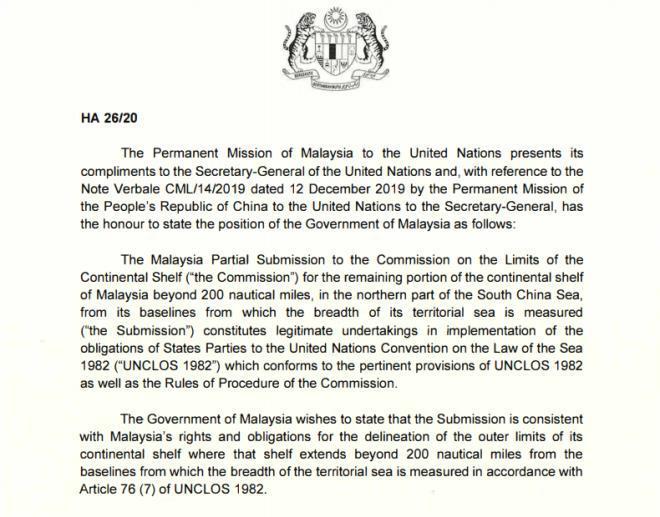 |
|
The Malaysian delegation to the United Nations sent notes denying China's East Sea claims
|
Meanwhile, the Malaysian Navy and Coast Guard patrolled near the West Capella exploration vessel and tracked the presence of the Chinese survey vessels in its EEZ in April-May. The Malaysian Government reaffirmed that it would protect the rights and interests of the country in the East Sea.
On August 13, Malaysian Foreign Minister Hishammuddin Hussein made a speech emphasizing perseverance and consistently using diplomatic methods. Malaysia was successful in making Chinese ships to leave the areas where its Petronas Corporation operates.
Fierce competition between the US and China
The relationship between China and the United States since the Covid-19 pandemic has entered a period of increasingly fierce competition in the race between a superpower and the one wishing to take the throne.
With the bipartisan consensus in the US on China issue, the new US administration will not be able to implement a more peaceable policy in the East Sea. However, the actual implementation may differ.
In 2021, the US will continue to increase the frequency of exercises with allies and partners, presence and patrol campaigns to ensure freedom of navigation (FONOP) in the East Sea.
The possibility of a clash between the US and Chinese military forces in this area remains unpredictable. Most likely, Washington will continue to impose additional sanctions against companies and individuals in China that the US believes commits violations in the East Sea.
The East Sea will be one of the most important places for the US to curb China's rise. Southeast Asian countries will become the focus of the growing Sino-American competition.
Road to complete COC still tough
China will continue to push territorial claims to divert attention away from economic troubles.
It is likely that in 2021, China will continue to put pressure on the exploration and exploitation of natural resources of the East Sea countries, and at the same time promote joint exploitation cooperation in Chinese style, through manipulating and dividing ASEAN countries.
In 2020, due to complicated epidemic developments, officials of the 10 ASEAN member countries and China could not meet to continue negotiations on the COC.
The sensitive nature of these negotiations does not allow it to be conducted via online form.
Beijing seems to want to resume negotiations. However, the stances of the parties are still very far apart. Moreover, as China ignores international law, and wants to monopolize the East Sea, maintaining the COC negotiation process is actually just a measure of buying time to implement its intentions in this sea.
Therefore, even when the discussions resume, the goal of completing the COC in 2021 that China unilaterally declared will be difficult to achieve.
Viet Hoang
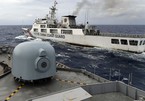
China increases activities to monopolize East Sea
Since the outbreak of the Covid-19 pandemic, tensions in the East Sea have increased.
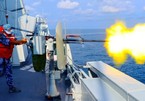
China's turning points to “mastering” operations in the East Sea
Experts believe that China already has a significant presence in the East Sea, going ahead of the US, and will use this advantage to force small countries to follow them.